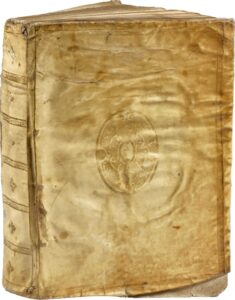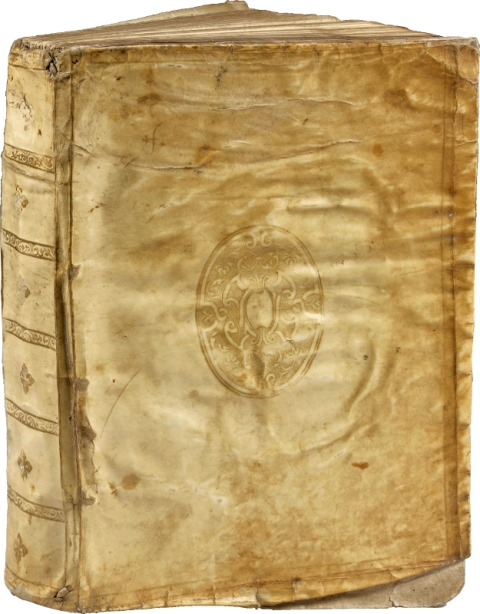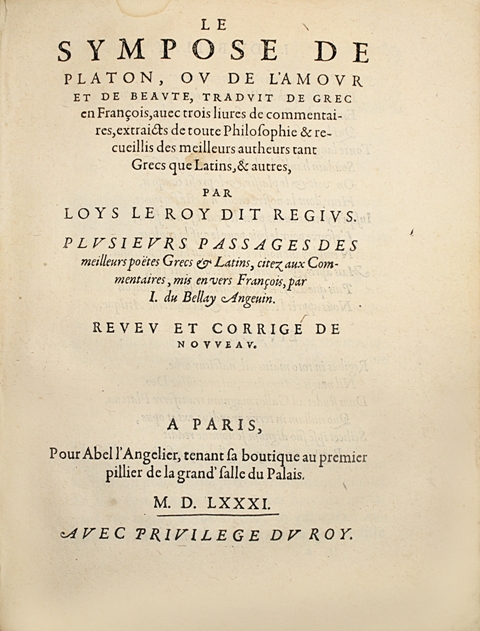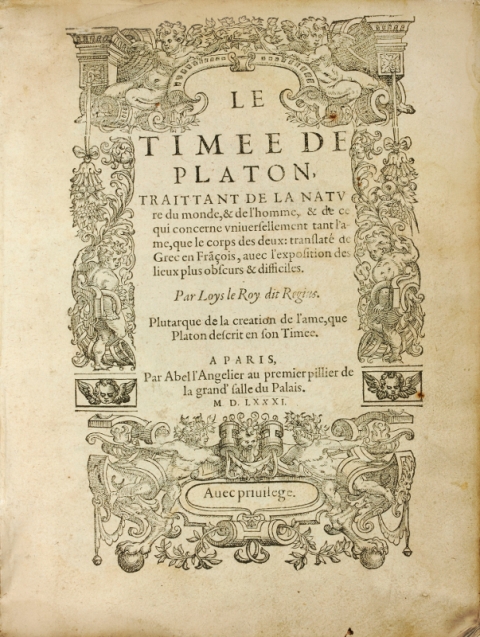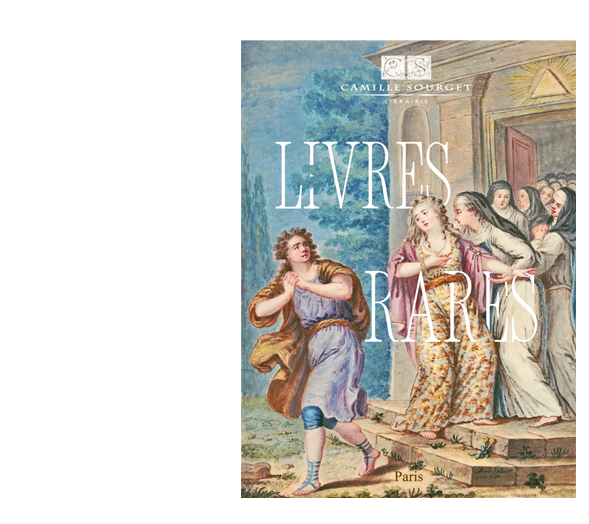PLATON. Le Timée de Platon, traittant de la nature du monde, & de l’homme, & de ce qui concerne universellement tant l’ame, que le corps des deux : translaté de Grec en Fraçois, avec l’exposition des lieux plus obscurs & & difficiles. Par Loys le Roy dit Regius. Plutarque de la creation de l’ame, que Platon descrit en son Timee. (Achevé d’imprimer le 23 mars 1581).
Paris, Abel l’Angelier, 1581.
[Bound with:][DU BELLAY, Joachim] / LE ROY, Louis. Le Sympose de Platon, ou de l’amour et de beauté, traduit de Grec en François, avec trois livres de commentaires, extraicts de toute Philosophie & recueillis des meilleurs autheurs tant Grecs que Latins, & autres, par Loys le Roy, dit Regius. Plusieurs passages des meilleurs Poëtes Grecs & Latins, citez aux Commentaires, mis en vers François, par I. du Bellay Angevin. Paris, Abel l’Angelier, 1581.
2 works bound in one 4to volume [219 x 166 mm] of: I/ ll. 1 to 8, (4) ll. of table, ll. 9 to 159, (1) l. of privilege; II/ (4) ll., 192 ll. with many pagination mistakes.
Some technical figures in the text of the Timaeus. A few waterstains in the first text. Bound in full contemporary limp vellum, gilt central medallion on the covers, flat spine decorated with gilt borders and fleurons, gilt edges. Slightly worn contemporary binding.
I/ Second edition of the French translation and of the comment of Plato’s Timaeus by Louis Le Roy.
Graesse, Trésor de livres rares, V, 324.
Louis Le Roy was in the sixteenth century with Aymot one of the best translators into French of the Greek philosophers, especially Plato and Aristotle. He often follows the text of Marsile Ficin’s Latin version because of an intellectual conformism imposed by the time, but his knowledge of the Greek language was serious and he makes a point of giving as much the ideas of the philosopher as the gracious layout of his dialog.
“Louis Le Roy, says Regius, Greek professor at the Royal College, has contributed a lot to give to French prose some elegance and harmony.” (Bibliothèque de Backer, 349).
“This work has exercised a huge influence on the later, Neoplatonic and Christian doctrines; on this last one especially the Timaeus encloses the seeds of some principles, such as, God’s disinterestedness in his creation’s work. We also can remark brilliant anticipations of later scientific discoveries […]. After having approached, in his dialectic dialogs, with an ever increasing strength the doctrine of the transcendental ideas, Plato had given in the Philebus a first systematic construction of his new theory: he proposed a definition of good, which didn’t involve anymore the Socratic detachment of the sensible world, but a life full of intelligence and pleasure, and also a definition of the reality as a mix between unlimited and limited. This point of view only starts the cosmologic doctrine developed in the Timaeus. In actual fact, the Pythagorean influence is far from being the only one detected in this majestic and bold work, where seem the converge all the scientific and metaphysic trends of the Greek thought, but transformed and sharpened by Plato’s genius and art.” (Dictionnaire des œuvres, VI, 431).
II/ Rare second edition of this French interpretation of Plato’s Symposium in which Joachim du Bellay took part.
Tchemerzine, III, 83; Graesse, Trésor de livres rares, 324; Brunet, IV, 702.
The wedding of the Dauphin of France and the Queen Mary Stuart is celebrated on April 24th, 1558 in the Cathedral Notre-Dame de Paris. This French version of Plato’s Symposium by Louis Le Roy was offered as a wedding gift to the Royal couple. The work is divided into 3 books, respectively addressed to the Royal couple, to François de Valois and to Mary Stuart.
The second part of the work (ll. 177 to 192) encloses the second edition of the translation into French verse by Joachim du Bellay of poems by Virgil, Horace, Lucretius, Ovid…
“At the verso of the title we can find a French sonnet and three Latin distiches by J. du Bellay. The 3 following ll. comprise an epistle ‘Au Roy-dauphin et à la Royne-dauphine’, at the date of Paris, April, 24th 1558, and the ‘Argument du Sympose de Platon’, by L. Le Roy.
A note by Louis Le Roy, talking about Greek and Latin verses mentioned in the Comments, says: ‘As I didn’t feel expert enough in French poetry to translate them justly, I prayed Lord du Bellay, an excellent poet in Latin and in French, to translate them, who, in the name of our longtime friendship, took this charge, which he performed so well that not only did he translate them faithfully, keeping the grandeur of their sentences, which is very hard in verse, but also represented the traits, figures, colors and poetic ornaments of the two most beautiful languages, with such dexterity that he seems to have matched the ones and surpassed the others.’
There are 57 translated extracts. A passage of Horace’s Poetic Art (f. 195) is borrowed from Jacques Pelletier’s translation.” (Picot).
“The erudite philosopher Louis Leroy made this nice translation. The first book is dedicated to the Roy-dauphin and the Royne-dauphine; the second one to François de Valois, king of Scotland and dauphin of France; the third, ‘à très illustre et très vertueuse princesse madame Marie d’Esteuart, royne d’Escosse et dauphine de France’. The beautiful and witty Mary Stuart, as soon as she arrived in France, got herself loved by poets and scholars, who weren’t ungrateful towards her for her misfortunes, despite the habit”.
(Bulletin du bibliophile et du bibliothécaire, n°464).
The interpretation of Plato’s Symposium by Le Roy becomes a real eulogy of marriage that he describes as the fundamental support of procreation and as the way to pursue the bloodlines of the monarchy.
“Precious [volume] by its literary interest” (Double, Cabinet d’un curieux, 10).
In its letter To the readers, Le Roy explains the importance of rediscovering the classical authors by society for the glory of the French language and identity.
The first edition of this text was printed in 1558, and reissued in 1559 with a relay-title.
Exceptional wide-margined copy, preserved in its beautiful contemporary limp vellum, a remarkable condition for the Pleiade’s poets.
OCLC lists 3 copies of this 1581 edition: in the Newberry Library, in the University of California and in the University of Mannheim. In France, only 4 institutions possess a copy.
Beautiful and pure copy gathering two major texts of the 16th century, very fresh and wide-margined, since preserved in its first contemporary limp vellum binding.
